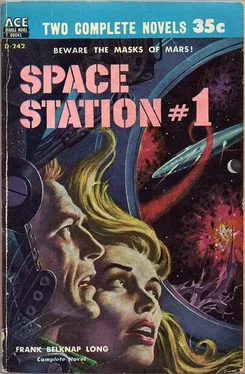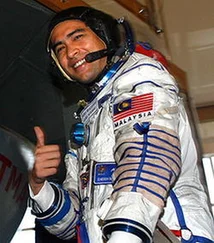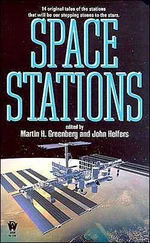Some of the men who had lost their lives had been blown out of transport rocket tubes by mistake. Some had missed their footing too close to a welding operation that had been halted too late. Some had floated into capsules full of nitric oxygen gas under high pressure and had failed to veer away in time. Still others had tugged too strenuously at heavy girders and the slow, but crushing inertia of an enormous, backward-swinging beam in free fall had ripped their space suits asunder and fractured their spines.
There were five thousand ways of dying in space. But the sacrifice, the terror, the tragic toll seemed immeasurably remote now, for the roar of the incoming and outgoing ships made the Station a gigantic reality so completely in the present that it seemed to have no past.
Spinning always on its axis, substituting centrifugal force for the gravity tug of Earth, the Station was a complete world, a self-contained macrocosm so immense that the magnetic-shod mechanics who inspected it in relays, the passenger-carrying shuttle rockets from Earth that came and went, and even the thousand-foot ships that berthed for re-fueling and clearance seemed hardly to enroach at all on its vast central bulk.
And yet, it was something quite apart from the Station’s bigness which came under worldwide scrutiny when the freighter crashed and was splintered into fragments, channeling a fiery crater in the earth and causing the most disastrous accidental death toll in United States history.
The news was flashed to the four comers of the earth, and almost simultaneously a flighty of United States military jets took off from the Lake Superior airport to explore the wreckage.
The first message from the flight commander, Lieutenant Colonel Hackett, came five hours later. It was tense, grim and it minced no words. “Wreckage radioactive. Main cargo uranium in a rough ore state. Explosion and subsequent intense radioactivity apparently caused by an auxiliary cargo of highly unstable uranium isotopes. If the freighter had berthed at the Station the dangerous character of its cargo could not have escaped detection. We have every reason to believe that it intended to berth at the Station. Its signals to the Station, before some undeterminable shipboard accident sent it out of control, confirm this. We must therefore assume complicity of a double nature: by the freighter’s commanding officer, Captain James Summerfield, and by someone in a position of high command on the Station”.
After that, there was no silencing the slow, relentless events on Earth.
A week after the tragedy, a U. S. Marine corporal stationed at Port Forrestal, Wisconsin, put through a late afternoon phono-view call to his wife. His face on the screen was haggard with strain, and he seemed not to want to meet his wife’s gaze.
“We’ve been ordered out into space”, he said.
“You mean they’re sending you out to take over the Station?”.
“They’re sending out five thousand United States Marines”, the corporal said. “We all knew it was coming. We expected it when that Governmental Investigating Committee was turned back”.
“But it doesn’t make sense. I can’t understand it. Why should the Commander of the Station refuse to permit a Governmental Investigating Committee to land?”.
“We don’t know. He must have something to conceal, and you can be pretty sure it’s an ugly something. When that freighter disaster got into every daily press conference of the high brass I knew this was coming. I felt it in my bones”.
“But what will happen if the Commander refuses to let even the Marines land? What will happen then?”.
“We may have to open fire on the Station”, the corporal said. “If the Station is in criminal hands we’ll have no alternative”.
“You talk as if you were in command”.
“I guess every soldier talks like that when his life is in jeopardy. But I’m glad I’m not a five-star general. If I had to make a decision like that” —
But it wasn’t a general who made the crucial decision. It was Admiral John Hayes, Commander of the Eighth Spatial Naval Division, acting on behalf of fifty-seven nations.
He stood in the bridge room of a United States naval cruiser of massive tonnage, staring out through a wide-view observation port at the Station’s glimmering immensity. The cruiser and the Station were moving at almost the same speed, fifteen thousand miles an hour. But now the cruiser was moving just a little faster than the Station, and Admiral Hayes was growing impatient.
Maneuvering into an orbital position almost directly abreast of the Station had been difficult. Commander Hayes’ nerves were badly frayed; and he was not a man who could endure too much frustration. He had signaled the Station twice and received no reply. During that time, both the Station and the Cruiser had completely encircled the Earth at an interval of just a little under two hours.
He turned suddenly from the viewport, his lips set in tight lines. He stared for an instant in silence at the young officer at his side, his mind groping for an argument which would completely justify what he had already decided he must do.
But Lieutenant Commander Kenneth Archer spoke first, saying quietly: “You have no choice, sir”.
Hayes’ features relaxed a little. It was good to know that he had support from a man whose judgment he respected. For an instant the awful aloneness which went with supreme command weighed less heavily upon him.
“It’s absolute defiance, open rebellion”, Hayes said. “I’m forced to assume that the Station is in criminal hands. We’ll never know, probably, just what happened on board that freighter. But we do know that accidents occur. For every thirty ships that berth securely, one meets with some kind of navigational mishap. The damage isn’t always irreparable. More often than not, in fact, it’s quite minor. Usually it means only a delay in berthing, a navigational shift, a circling back for another try. But apparently that freighter really had it. So it gave the show away. Commander Clement must be in league, hand in glove, with whoever is interested in smuggling unauthorized uranium shipments through to Earth for his own personal profit. And to hasten his immediate profit that someone apparently found it to his advantage to trigger a little of the shipment into highly fissionable material on Mars”.
“You know as well as I do who the someone is, sir”, Archer said.
“I guess we both know. But right now my only concern is with the Station. If they ignore my third order to stand by for boarding I’ll have to open fire. The Station’s stolen property just as long as it remains in criminal hands. You can’t get a desperate criminal to surrender your property unless you convince him his own life is in danger. I’ve got to try my best to convince Commander Clement I mean business without destroying the Station”.
“You’ll damage it to some extent, sir. How bad do you think it will be?”.
“I don’t know. I don’t intend to launch an atomic warhead. But I can’t stop short of that if he stays stubborn. I’ve no way of knowing what his breaking point will be. But I do know that if he keeps control of the Station he’ll be in a position to wipe out New York or London”.
“But you’ll make your intentions unmistakably clear before you open fire, sir?”.
“Yes”, Hayes said, wearily. “Yes... of course I will”.
CORRISTON took a deep breath and let it out slowly. So far luck had favored him. Now he felt as though he were walking through a deadly jungle where all the animals had suddenly turned friendly. The teeth they bared at him were smiling. The grins were their masks. But the commander didn’t pretend at all... whoever the commander really was!
Читать дальше












